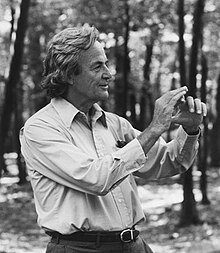Richard Feynman
Appearance
Richard Phillips Feynman (pípè /ˈfaɪnmən/ FYEN-mən; May 11, 1918 – February 15, 1988) je was an American onimo fisiiki ara orile-ede Amerika.

|
Àyọkà yìí tàbí apá rẹ̀ únfẹ́ àtúnṣe sí. Ẹ le fẹ̀ jù báyìí lọ tàbí kí ẹ ṣàtúnṣe rẹ̀ lọ́nà tí yíò mu kúnrẹ́rẹ́. Ẹ ran Wikipedia lọ́wọ́ láti fẹ̀ẹ́ jù báyìí lọ. |
Itokasi
[àtúnṣe | àtúnṣe àmìọ̀rọ̀]- ↑ 1.0 1.1 1.2 1.3 1.4 1.5 "Richard Phillips Feynman". Mathematics Genealogy Project (North Dakota State University). Retrieved 2010-03-18.
- ↑ "I told him I was as strong an atheist as he was likely to find" Àdàkọ:Harv

